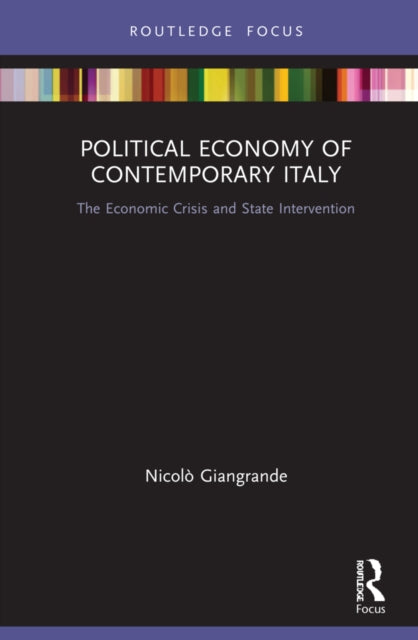Nicolo Giangrande
Political Economy of Contemporary Italy: The Economic Crisis and State Intervention
Political Economy of Contemporary Italy: The Economic Crisis and State Intervention
YOU SAVE £2.31
- Condition: Brand new
- UK Delivery times: Usually arrives within 2 - 3 working days
- UK Shipping: Fee starts at £2.39. Subject to product weight & dimension
Bulk ordering. Want 15 or more copies? Get a personalised quote and bigger discounts. Learn more about bulk orders.
Couldn't load pickup availability
- More about Political Economy of Contemporary Italy: The Economic Crisis and State Intervention
The book investigates the reasons behind Italy's economic stagnation from the 1970s and proposes policy solutions to address the crisis. It argues that lack of investment, rising labor precariousness, and wage moderation contributed to declining productivity and economic growth. The book highlights Italy's unique case study, involving faster adoption of neoliberal policies than other OECD countries, and calls for an alternative economic policy to promote innovation, reduce unemployment, and stimulate economic growth.
Format: Hardback
Length: 106 pages
Publication date: 17 September 2021
Publisher: Taylor & Francis Ltd
Drawing on the Kaleckian and Kaldorian approaches, Political Economy of Contemporary Italy: The Economic Crisis and State Intervention delves into the underlying reasons behind the stagnation of the Italian economy from the 1970s and proposes policy solutions to alleviate the crisis. The central thesis of the book is that from the early 1990s, Italy experienced a persistent decline in both private and public investment, coupled with rising labor precariousness and wage moderation, which contributed to the decline in both labor productivity and economic growth. It is argued that the absence of industrial policies exacerbated the problem of poor macroeconomic performance, as Italian firms, characterized by their small size and lack of innovation, struggled to remain competitive on the global stage. Net exports failed to compensate for the reduction in public spending, private investment, and consumption. Furthermore, the book demonstrates that Italy serves as an intriguing case study with broader implications, as it was involved in the global process of intensifying the neoliberal agenda at a faster rate than other OECD countries. The book concludes with a strong call for an alternative economic policy aimed at promoting innovation, reducing unemployment, and stimulating economic growth.
This book makes a substantial contribution to the literature on the recent history of the European economy, Italian studies, and the history of economic thought. It offers valuable insights into the challenges faced by Italy and provides practical solutions to address the economic crisis. The book's interdisciplinary approach, combining economic analysis with political and social factors, enhances its relevance and effectiveness in understanding the complex dynamics of the Italian economy. By examining the historical roots of the crisis and exploring the policy choices made by different governments, the book sheds light on the factors that contributed to Italy's economic stagnation and provides a roadmap for future growth and development.
The book's findings are particularly relevant in the current global economic context, where many countries are facing similar challenges. The decline in private and public investment, coupled with rising labor market insecurity, has led to sluggish economic growth and increased unemployment. The book's analysis of the role of industrial policies and the need for innovation highlights the importance of targeted interventions to stimulate economic activity and promote job creation. The call for an alternative economic policy emphasizes the importance of promoting sustainable and inclusive growth, which should include measures to address social inequality, improve education and training, and invest in infrastructure and research.
Overall, Political Economy of Contemporary Italy: The Economic Crisis and State Intervention is a valuable resource for scholars, policymakers, and anyone interested in understanding the economic challenges facing Italy and the broader European economy. It provides a comprehensive and insightful analysis of the factors contributing to the crisis and offers practical solutions for promoting economic growth and stability. The book's interdisciplinary approach and its commitment to promoting sustainable and inclusive growth make it a valuable contribution to the literature on economic development and policy.
Weight: 272g
Dimension: 142 x 223 x 15 (mm)
ISBN-13: 9780367544423
This item can be found in:
UK and International shipping information
UK and International shipping information
UK Delivery and returns information:
- Delivery within 2 - 3 days when ordering in the UK.
- Shipping fee for UK customers from £2.39. Fully tracked shipping service available.
- Returns policy: Return within 30 days of receipt for full refund.
International deliveries:
Shulph Ink now ships to Australia, Belgium, Canada, France, Germany, Ireland, Italy, India, Luxembourg Saudi Arabia, Singapore, Spain, Netherlands, New Zealand, United Arab Emirates, United States of America.
- Delivery times: within 5 - 10 days for international orders.
- Shipping fee: charges vary for overseas orders. Only tracked services are available for most international orders. Some countries have untracked shipping options.
- Customs charges: If ordering to addresses outside the United Kingdom, you may or may not incur additional customs and duties fees during local delivery.


